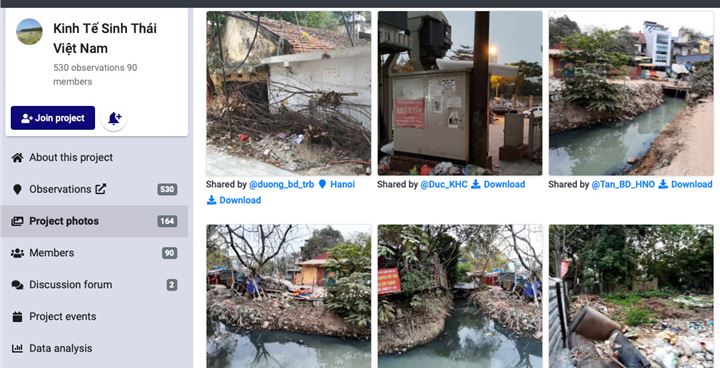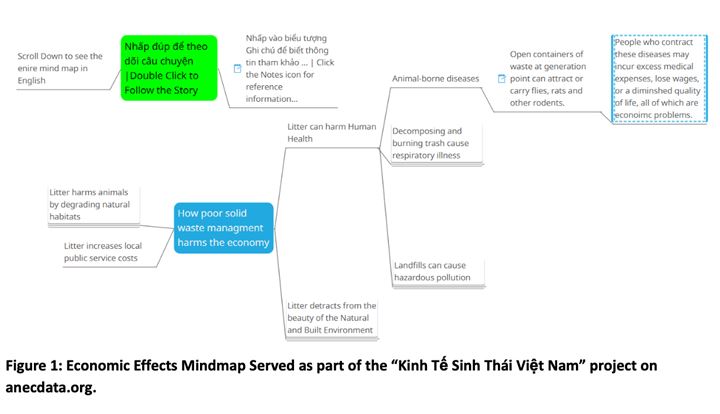Purpose
- Investigates the causes of economic imbalances.
- Explores and develops market-based solutions.
Summary
To prepare for building out the capacity of Anecdata.org to meet the growing needs of citizen science projects around the world, we are adding a language translation feature. Anecdata already has many valuable features including mapping, photo uploading, and data visualization. After the language translation feature is in place, we will add civic action tools to promote civic action among project participants from around the world. The focus of this project will be on debris in coastal cities of Vietnam. The new tools will enable Vietnamese speakers to participate in citizen science projects to clean up debris and instantly see the economic benefit of their actions. Armed with this information, citizens may be able to get local governments to take action to help eliminate sources of debris that might ultimately end up in the marine environment.

Screen shot of project page from Anecdata website.
Description
As a result of our work together on this project, Anecdata has both the multilingual capabilities and the flexibility to grow and evolve with the need for solid information about ecological-economic issues in Vietnam. Local organizations, starting with our partner/client Keep Hanoi Clean and others (see below) are using Anecdata in an effort to develop a province-wide environmental assessment that will identify municipal solid-waste (MSW) management hotspots where additional resources and better strategy is most needed. We are also using the ancedata project to help educate users about the connections between MSW problems and economic, health, and other effects on human well-being. Finally, we are looking forward to a day when data collected on anecdata .org can support quantitative estimation of the ecological, public health, and economic risks presented by poorly managed MSW.
As that last sentence implies, however, we have had to adjust our expectations or target outcomes for this project. Initially, we had hoped to develop an algorithm by which an estimate of the economic impact of any particular quantum of poorly managed MSW, be it a pile of household waste awaiting pickup, a pile of construction debris, or old furniture burning by the roadside. In theory, each of these situations would contribute, marginally and for example, to an erosion of aesthetic value that can dampen tourism expenditures, to road hazards that cause damage and excess repair costs for vehicles, and exposure to airborne toxins that lead to excess morbidity and premature mortality. Each of these could have significant economic costs.
We were not able to achieve that vision within the scope of this small project, however. We encountered two barriers, the first of which is a paucity of primary studies necessary to provide a robust and therefore credible means of connecting the dots from litter piles in various locations, to human exposure, to lost wages or other economic indicators. The second has been the simple technical difficulty of translating observable data into even biophysical measures (weight and volume) of observed/collected MSW. We have completed an extensive review of the scientific literature on MSW issues, and we have found that while there is information that could inform parts of the envisioned algorithm (e.g. rates of “leakage” of trash from the MSW management system to the environment, such as from an overflowing dumpster to a waterway), there is very little beyond anecdotal evidence on the economic end of the envisioned algorithm.
Moreover the data requirements to use even existing leakage calculators with a much narrower scope and ambition are beyond the current capabilities of this project. For example, the International Solid Waste Association, working with a team of researchers at the University of Leeds, have developed a “Plastic Pollution Calculator” that estimates the quantity of plastic waste only at risk of reaching oceans or otherwise damaging the environment. Even so, that tool operates at a district level — the equivalent of a county in the U.S. and not at the fine-grained level at which Anecdata observations are collected. (We are reaching out to the Leeds research team, however, to determine how we might be able to use our data in a future version of that model that also covers other important components of the MSW stream.)
All of that said, we are still pursuing the ultimate goals of this project, and we have made important strides toward it in this project by focusing on four intermediate steps:
? Making anecdata.org accessible to persons who do not speak English
? Building, testing, and rebuilding an anecdata project for the collection of detailed MSW information by volunteer citizen scientists.
? Working with Keep Hanoi Clean to pilot the data collection effort as part of its “Hanoi Province Environmental Conditions Assessment” and, more recently, working with other organizations to use our project for household, business, and other waste audits.
? Developing summary information about economic effects of MSW leakage and presenting that information through an interactive tool within the anecdata project.
Economic effects of MSW leakage
We are presenting evidence from existing literature on the effects of poorly managed solid waste on human welfare in the form of an online “mind map” served directly in the Kinh T? Sinh Thái Vi?t Nam anecdata project3. Part infographic showing causal pathways and telling a story about how waste in the environment translates to costs in the economy, and part annotated bibliography (because notes on “nodes” in the mindmap can include further details germaine to this project as well as full reference information), the mindmap encourages users to dive as deeply as they like into any particular type of impact.
In the screenshot below an English-speaking user is following the Human Health pathway to learn how litter provides habitat for animals who can pass diseases on to humans, causing excess medical expenses, lost wages, and diminished quality of life.
Future Possibilities related to economic effects include our continual review of the literature on MSW impacts and the addition of details and new pathways to the initial mindmap. Eventually, we do hope to use the data collected through the anecdata.org project to feed into quantitative estimates of the economic, human health, and other effects, but as explained above, that proved to be beyond the capacity of this small project.
The complete "Final Report Jan. 2022" is posted under "Attachments".

Purpose
Investigate Causes of Economic Imbalances: Economic imbalances exist where plastic pollution and other environmental problems affect human health, safety, and livelihoods. Anecdata.org is an online tool to help individuals and organizations create projects, and collect, share, and visualize data in order to mitigate problems, effect change, and address economic imbalances in communities.
Explore and Develop Market-Based Solutions: Anecdata.org will help organizations explore and develop market-based solutions to problems like plastic pollution in coastal areas, sea level rise, ocean acidification, and coastal flooding. The Anecdata platform has applications beyond collecting environmental data and can be used to crowdsource information in public health or economics, for example, on emerging diseases or economic impact of marine debris.
Scope
Anecdata.org is a “next-generation” online data portal, with a unique feature set. We have made the site free and openly available for other organizations to create citizen science and other projects, invite users, and manage and share environmental data. The site is already host to 186 projects from around the world, with nearly 7400 users. Several of these projects relate directly to coastal and marine debris issues. Anecdata has the potential to host thousands of projects across the world. We plan to build out the capacity of Anecdata.org to meet the growing data management needs of numerous organizations working on the front lines of environmental change. In order to promote action on marine debris and other issues, we will add a civic action toolkit, including economic and international language tools, to the website.
Information Dissemination
This project will be advertised with groups in Hanoi such as Keep Hanoi Clean (KHC) to garner participation in solid waste reconnaissance and debris clean-up projects. The MDI Biological Laboratory will write press releases and feature this project on our website. Anecdata will use social media platforms for sharing and post progress on the CitSci listserv.
Project Link https://www.anecdata.org/projects/view/477
Amount Approved$11,000.00
on 12/9/2019
(Check sent: 12/17/2019)